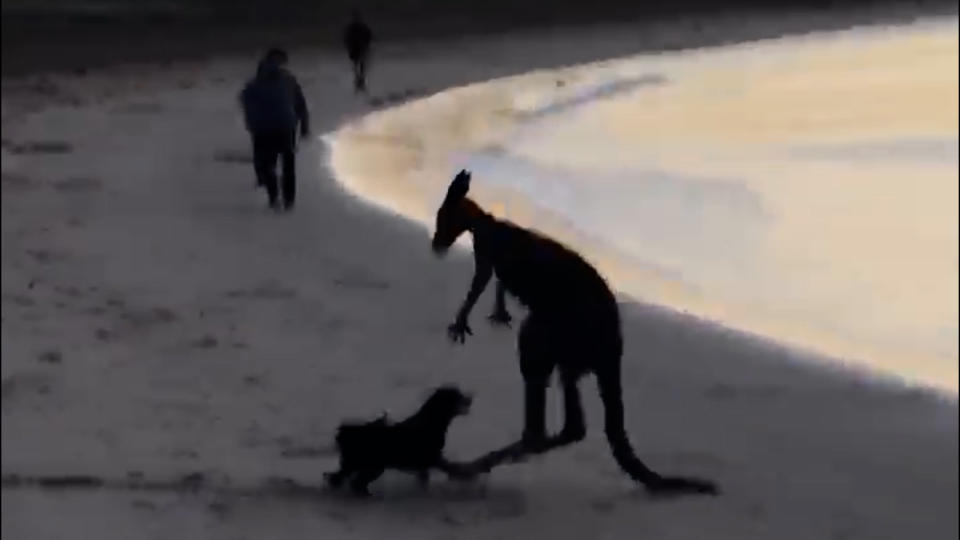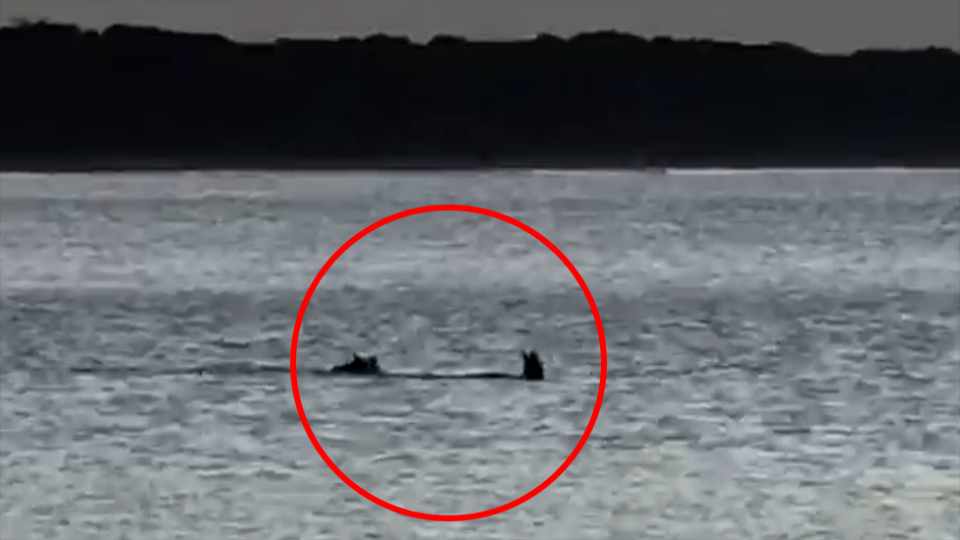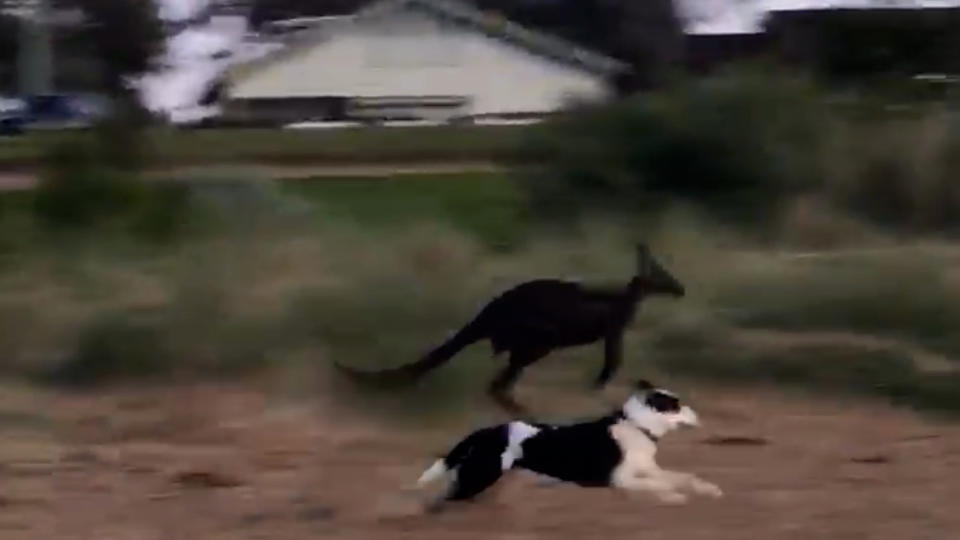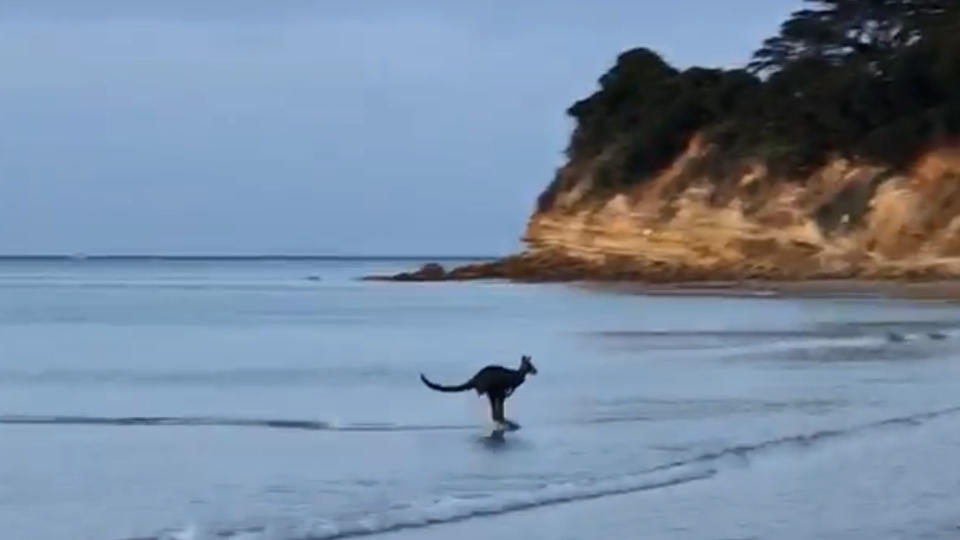Disturbing scene on off-leash beach highlights 'pretty horrible' issue
Footage of a kangaroo chased into the ocean by barking dogs has led to concern that ongoing development is leaving wildlife with nowhere to go.
Video shot on Sunday morning in Torquay, 81km southwest of Melbourne, shows a small brown kelpie chasing a frightened marsupial across Fishermans Beach.
The sound of its splashing drowned out by the slow rolling waves as the kangaroo seeks shelter in the ocean.

Deep in the water, the animal’s head can be seen bobbing, and it looks to finally be safe.
The respite is short lived.
Determined not to abandon its target, the dog paddles in behind the kangaroo.
According to a witness, the dog owner didn’t seem to notice what was happening until his pet was in the water.
Torquay resident Genene Priest, who filmed the incident, can be heard gasping from behind the camera as a struggle begins between the two animals.
“When it got there there was this fight in the water and the dog must have thought uh-oh I’m going back,” she told Yahoo News Australia.
“After that the kangaroo did a big circle and climbed back out again and then ran along the beach.
“That’s when a second dog, a border collie came and chased it.”

Light is beginning to drench the beach as the kangaroo is chased across the sand again, the dog’s owner yelling for “Ozzy” to come back.
Ms Priest said the second dog didn’t go for the kangaroo’s legs, but behaved as if it was trying to round it up like a sheep.
The border collie is quickly brought under control, but the kangaroo has little time to catch its breath.

“Oh no”, Ms Priest can be heard exclaiming as a tiny black dog charges in, lunging at the frightened animal’s feet.
Although the owners successfully call their dogs back to heel, the kangaroo appears defensive and seeks refuge in the freezing winter waters again.
‘Kangaroos don’t have anywhere to go’
Despite the distressing ordeal, Ms Priest does not blame the dogs or their owners for the attack, noting that it is an off-leash area and wildlife is not regularly seen at the beach.
“It came out of nowhere, you just can’t predict a kangaroo coming onto the beach like that,” she said.
“I’ve been here 30 years, I come here every day, but I’ve never seen a kangaroo on the beach before.
“Years ago, surfers used to come down here and it was a dirt track, I suppose there were kangaroos everywhere then.”

As the once sleepy surfer town of Torquay is developed to meet the demands of a growing population, Ms Priest said locals are seeing an increase in seemingly displaced kangaroos around town.
“Their corridors are getting built out and the kangaroos don’t have anywhere to go,” she said.
“People are always complaining about them being built out and they have nowhere to go.”
Kangaroo may face a slow death despite no physical injuries
While the Torquay incident occurred in an area where dogs are allowed off leash, many of the dog and cat attacks wildlife carers see are in areas where pets are supposed to be restrained.
Wildlife Victoria CEO Megan Davidson told Yahoo News Australia that dogs and cat attacks are a common occurrence.
“It’s pretty horrible for rescuers to have to deal with these situations because the outcome is usually not a good one,” she said.
“There’s not many animals that survive a dog attack, sometimes dogs are just playing, but it will still kill them.”

Even when macropods (kangaroos, wallabies and pademelons) survive being chased, they are vulnerable to a stress induced condition called myopathy.
They do not have to be physically injured to be killed by the ailment, but over a period of days and weeks, it will disintegrate muscle fibres and lead to complete paralysis.
Ms Davidson is urging pet owners to be aware that they are often sharing reserves and beaches with wildlife.
“Dogs instincts are to hunt, so I would never blame the dog for an attack, I would always blame the owner for failing to control the dog,” she said.
“Wherever there are dogs off lead there will be very little wildlife because the dogs will have killed it all or chased it away.
“People always say, well we haven’t seen any wildlife here when we ask them to put their dogs on a lead and we say that’s people of people not having their dogs on a lead.
“If people had their dogs on a lead you’d see more wildlife.”
The author, Michael Dahlstrom, is a registered wildlife carer in NSW.
Do you have a story tip? Email: newsroomau@yahoonews.com.
You can also follow us on Facebook, Instagram and Twitter and download the Yahoo News app from the App Store or Google Play.




